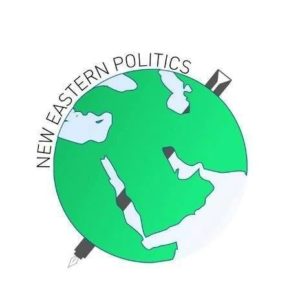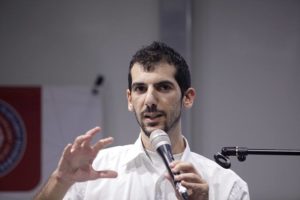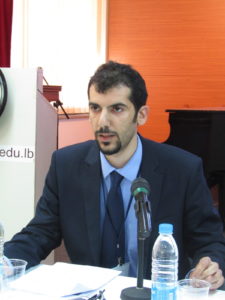How youth address political, cultural and socio-economic challenges of the Middle East, North Africa and the Caucasus (MENAC) regions
About us

NEP logo
The purpose of this website is to encourage political and social science students and young scholars to publish their articles and research papers that address the historical, socio-economic, cultural and political realities of the MENA (Middle East & North Africa) and Caucasus. The History of “New Eastern Politics” goes back to 2010. It was founded by Lebanese-Armenian political activist Yeghia Tashjian, as a first step to encourage Armenian-Turkish academic dialogue on social media. Later, with the growth of the number of followers and the eruption of the Arab Uprising, the forum became a network of dialogue attracting the influx of new opinions and ideas shaping the region.

During my presentation “End of civilization? From Cultural cleansing to Genocide: the plight of Christians in Syria and Iraq” at the conference “After Genocide: From Trauma to Rebirth: a Gendered Perspective” (Yerevan Armenia, AGBU Yerevan Center, Sept. 19, 2016)
Initially, the purpose of the dialogue was to discuss the Armenian-Turkish protocols (known as Zurich Protocols) which was signed in 2009 both by Armenia and Turkey to allow the opening of borders and to set up a formal diplomatic relationship but later it was not ratified. Later on, with the spread of protests in the MENA region, the forum attracted thousands of Arab, Jewish, Kurdish, Armenian, Turkish, Baloch, Yezidi, Assyrian-Aramean, Amazigh, and other students from different political background aiming to build bridges between different communities and strengthen civil dialogue. The forum on Facebook also attracted many journalists, activists, political science, international relation, history and sociology professors which helped to increase the qualitative level of the debates. The Website also welcomes articles from bloggers from non-MENAC countries that reflect their experiences in the region.

While presenting my paper “Armenians in Iraqi Kurdistan and the Prospects for Armenia-KRG Relations” during the “Armenians in Iraq” conference organized by the Armenian Diaspora Research Center (ADRC) at Haigazian University 31/5/2017 .
Why the NEP Network?
The aim of the New Eastern Politics Network differs from the forum. The former encourages young activists and scholar to publish their articles while the later opens the arena so that people engage in civil dialogue and exchange opinions and ideas. The network deals with critical and analytic articles representing different views of different students and scholars from different academic, political and cultural background. The network has five key aims and objectives (short and long terms): networking, information sharing, policy engagement, collaboration in research and establish a future Research Center/Think Tank.
1-Networking
We are a community of researchers, students, activists and bloggers who teach, write and develop policy making, conduct interviews, write articles that seek to find solutions to the ongoing political, cultural and socio-economic crisis of the MENAC region. Our purpose is to help you expand your information knowledge, strengthen your academic research skills and build networks with bloggers, activists, and professors.
2. Information sharing
Due to the fact that most young researchers in the field of politics and international relations are spread across a wide array of universities, public bodies and non-profit organizations it is difficult for academics, public policy makers and members of the general public to keep up to date with the news and researches that are being carried in the region. The NEP Network will allow for the easy dissemination of research to members via its social media forums (Facebook + Twitter) and through its links with internationals conferences, think tanks, workshops, and seminars. Please join the Network today to receive emails with updates on recent publications, upcoming events.
3. Public policy engagement and collaboration
The growing field of political studies in the region has produced an abundance of knowledge about the causes and consequences of different political issues in MENAC . However, much of the knowledge produced remains locked into pay-for-view academic journals which are viewed primarily by senior academics. A key aim of our Network is, therefore, to engage public policy makers in the study of politics, culture and socio-economic by providing a free excess of in-depth analysis of regional events. Engagement will additionally be pursued via key annual events including conferences, workshops, and seminars with the intention of making the debates more interactive.
4. Collaboration with different NGOs and Regional think tanks
Our aim is to develop collaborative research projects across the region. By bringing together young scholars, activists and research bodies from different countries, the Network will facilitate collaborative engagements with different NGOs and think tanks located in the region.
5. Establishing Research Center/Think Tank
On a long run, we are aiming to establish a research center or a think tank. Aiming to conduct and foster outstanding research and learning in the political and social sciences; thus contributing to the next generation of MENAC leaders in many spheres (ethical decision making, networking…). Currently, we are conducting interviews with regional artists and policy makers in order to widen our scope. In the future, we will seek to promote fruitful interactions between artists, researchers, and specialists both nationally and internationally by providing an open forum for the larger academic and cultural community. Furthermore by addressing the concerns and expectations of the local community we seek for the advancement of regional dialogue within a multicultural diverse environment.
Our team:
Founder and Manager: Yeghia Tashjian
Contributors:
Christiane Waked; Art & Culture
Joe Hammoura; Specialist in Turkish affairs
Eduard Abrahamyan; Specialist in Southern Caucasus affairs






Follow Us!